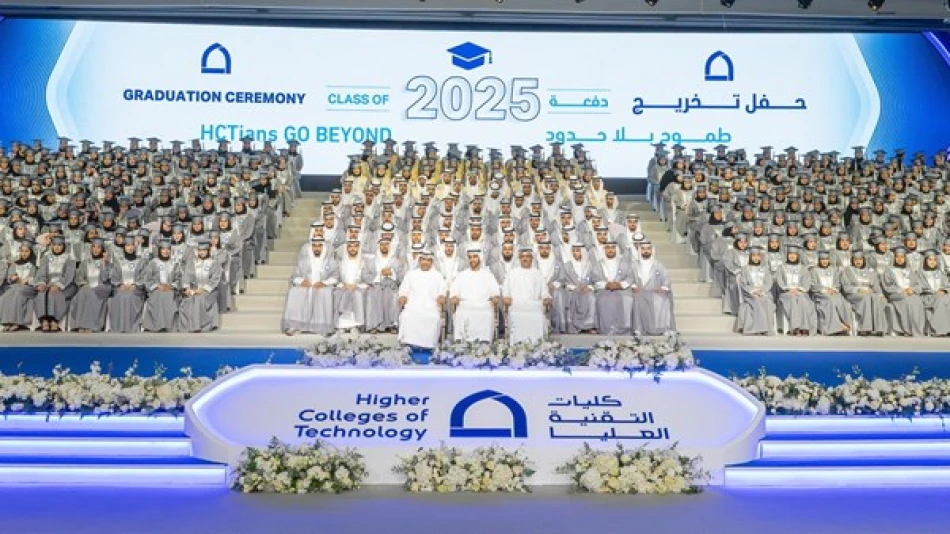
RAK Ruler Presides Over Graduation of 576 Higher Colleges of Technology Students
UAE's Ras Al Khaimah Graduates 576 Tech Professionals as Emirates Double Down on Human Capital Investment
The UAE emirate of Ras Al Khaimah has graduated 576 students from its Higher Colleges of Technology in a ceremony that underscores the nation's strategic pivot toward building indigenous technical expertise. With 58 graduates earning distinction and honors, the "Limitless Ambition" themed graduation represents more than academic achievement—it signals the UAE's commitment to reducing dependence on foreign talent while positioning itself as a regional technology hub.
Strategic Workforce Development in Action
Sheikh Saqr bin Saud bin Saqr Al Qasimi, Chairman of RAK Ceramics, presided over the ceremony at the Hamra International Exhibition and Conference Centre, emphasizing that Emirati youth form the "fundamental pillar" of the nation's development trajectory. The graduates span critical sectors including engineering, health sciences, business administration, computer and information sciences, applied media, and education.
This graduation cohort arrives at a pivotal moment for the UAE economy. As the nation diversifies away from oil dependency through initiatives like UAE Vision 2071, which aims to make the Emirates the world's best country by its centennial, locally-trained technical professionals become increasingly vital to sustaining economic transformation.
The Economics of Educational Investment
The emphasis on technical education reflects a broader Gulf strategy seen across the region. Saudi Arabia's Vision 2030 similarly prioritizes human capital development, while Qatar's National Vision 2030 focuses on knowledge-based economic diversification. However, the UAE's approach distinguishes itself through practical, industry-aligned programs designed to meet immediate market demands.
Market-Ready Skills for Economic Diversification
Dr. Faisal Al Ayyan, Director of the Higher Colleges of Technology Complex, highlighted how the institution's outputs align with national ambitions. The curriculum's focus on applied sciences and technology directly supports the UAE's push into artificial intelligence, renewable energy, and advanced manufacturing—sectors that require substantial local expertise to achieve global competitiveness.
The timing is particularly significant as the UAE faces increasing competition from regional rivals. Singapore's technical education model has long been cited as exemplary for small, trade-dependent nations, while countries like Estonia have demonstrated how strategic investment in digital skills can transform entire economies within a generation.
Beyond Ceremony: Real Economic Impact
For investors and multinational corporations, these graduates represent a maturing local talent pool that could reduce recruitment costs and cultural barriers. The UAE's labor market has historically relied heavily on expatriate professionals, creating both opportunities and vulnerabilities. A stronger pipeline of local technical talent offers greater workforce stability and cultural continuity for businesses operating in the Emirates.
Regional Competition and Collaboration
Ras Al Khaimah's educational investments also reflect inter-emirate competition within the UAE federation. While Dubai focuses on financial services and trade, and Abu Dhabi emphasizes energy and sovereign wealth management, RAK has carved out niches in manufacturing, tourism, and increasingly, education and research. This specialization strategy mirrors successful small-state models like those of Switzerland or Denmark.
The graduation ceremony's emphasis on "limitless ambition" suggests confidence that these technical professionals will drive innovation rather than merely fill existing roles. This ambition will be tested as graduates enter a job market increasingly shaped by automation, artificial intelligence, and global economic uncertainty.
As the UAE approaches its 2071 centennial vision, investments in technical education like those demonstrated in Ras Al Khaimah will likely determine whether the nation achieves its goal of becoming a global knowledge economy or remains primarily dependent on traditional trade and energy sectors.
Most Viewed News

 Layla Al Mansoori
Layla Al Mansoori






